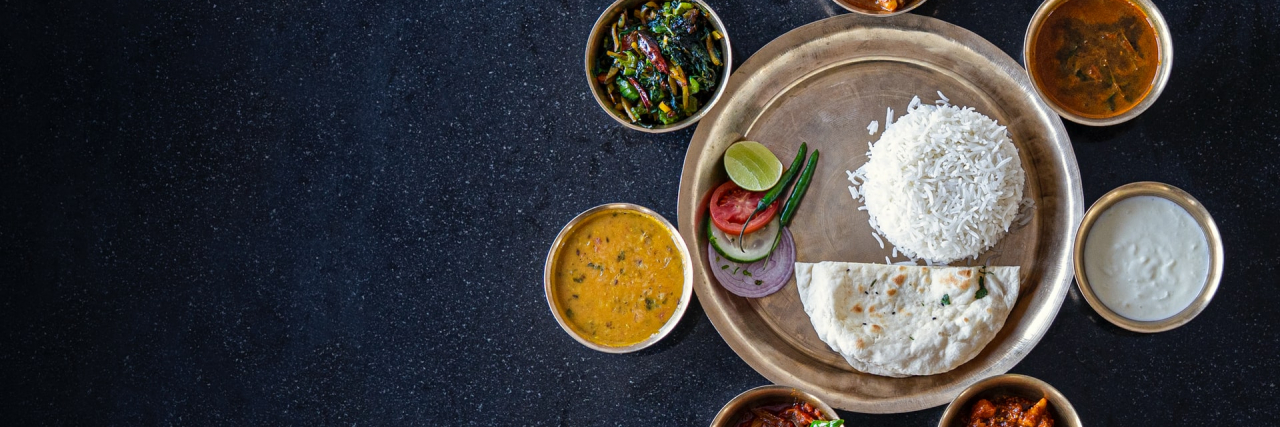Like many, food had never solely been a form of sustenance for me. No, no… It was an integral part of my cultural identity. A source of solace at the end of a long day. An excuse to meet up with friends when I knew I should be studying for a midterm.
I refer to this in the past tense because my relationship with food has changed since chronic illness entered my life. For the past three years, I’ve lived with a mysterious gastrointestinal motility disorder. And last year, I was diagnosed with an esophageal stricture. Essentially, my stomach and esophagus don’t move food through my system as they ought to, making eating a painful and anxiety-ridden act.
Prior to my illness, my relationship with food wasn’t the healthiest. While I’d never been diagnosed with an eating disorder, I did have obsessive tendencies, swinging like a trapeze artist from one diet to the next. I went through cycles of bingeing and restricting. But the thing was, I always felt a sense of control. Food was at my mercy, not the other way around.
Until my gut shut down. Suddenly, food was dangerous — it had the power to physically hurt me. To render me supine for hours at a time, heating pad pressed against my chest. When I eat certain foods, I never know if they’ll get stuck in my throat or lead to a frustrating bout of indigestion. The types and textures of food I can tolerate have dwindled. Most of my meals are in pureed form, and the solid foods I can eat are softer, like sweet potatoes and nut butters. As someone who comes from a Gujarati American family, in which food is its own love language, this has proved an adjustment to say the very least.
The social side of my health situation has borne a heavy load of challenges. Whereas invites to dinner with friends were once an exciting prospect, they now spur me into overthinking. And though I’ve been blessed with support, nothing prepared me for the onslaught of insensitive statements. I’ve been accused of having an eating disorder. Several specialists have sifted through my medical records, then insisted antidepressants were the antidote to my ailments. A guy I dated told me I should be glad because many women would love to have a body that was unable to eat more. (Shocker — we didn’t last long.)
It can be difficult to detach from the emotional pain that arises from dietary restrictions. On the one hand, you know that, from a rational standpoint, you’re doing what’s best for your body. But on the other, you watch your loved ones consume glutenous, dairy-laden delicacies as you’re eating pureed food for the umpteenth meal. There’s no denying how isolating that feels.
And let’s be real. We live on a food-centric planet. TV advertisements, aromas at the grocery store, sounds of sizzling sausages — these sensory inputs are tough to escape. And the evolutionary hardwiring even more so. From the beginning of time, our species has used food to bond. Recipes are passed down from generation to generation, a sentimental form of keeping our traditions alive. Science has even shown that when we share meals with others, we feel happier and more connected.
Unlike regimented healing protocol, there’s no roadmap for navigating the emotions that arise during chronic illnesses. The line between doing what’s best for your mental versus physical health can be porous. Do I eat this food I’m craving even though I know it’ll leave me doubled over afterward? Should I eat a meal even though I have zero appetite?
Therapy has been a major source of understanding my attitudes around food. It’s allowed me to examine the detrimental narratives I’d been feeding myself (pun not intended). It’s shown me to lean into my body’s cues, to be patient with it. A lot of the work involves digging into my own internal landscape, like an excavator searching for fossils of faulty belief systems wired into my brain.
I know I’m hardly the only one with a distorted relationship to food because of chronic illness. Those with food allergies must remain vigilant to avoid anaphylactic shock. Individuals with IBD and IBS have their own gastrointestinal and bathroom-related repercussions. Even people with other chronic illnesses reduce or restrict foods to keep symptoms at bay.
The biggest thing we can do is show ourselves compassion. Accept where we are in our journeys. And understand that there are other ways to derive joy, connection, and a sense of meaning in this world that don’t center around food.
For so long I felt alone, resentful, scared, and mournful. But I know the catalyst for change comes from sharing my story. Hopefully, psychological studies will look deeper into this phenomenon and there will be a greater dialogue. Wherever your relationship is with food, know that your feelings are valid and worthy of acknowledgment.
This story originally appeared on Brina’s blog.
Photo by rajat sarki on Unsplash

